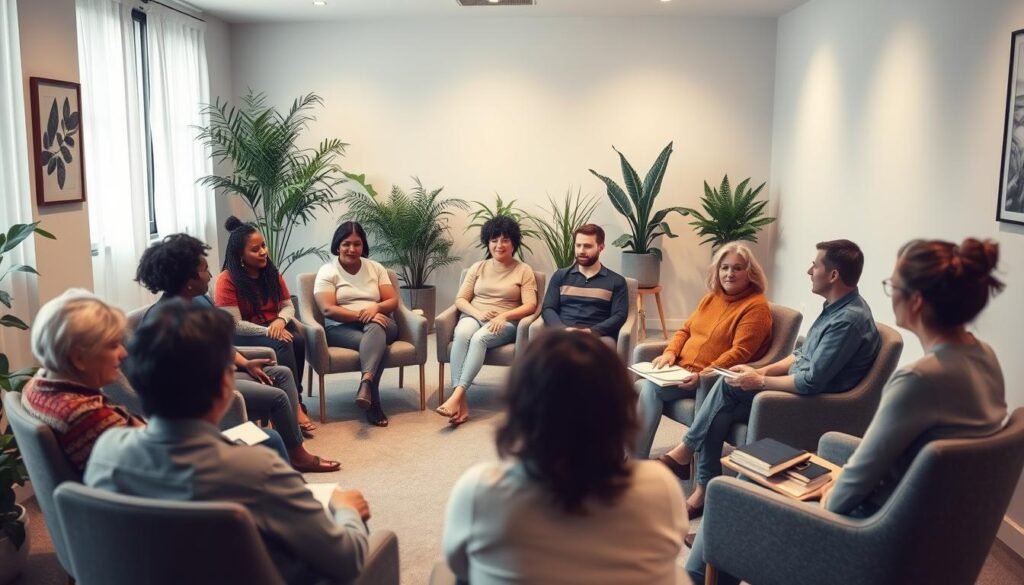About 7% of people in the U.S. struggle with social anxiety disorder. This condition makes them fear judgment and avoid social situations. It can greatly impact daily life. Yet, there’s good news. There are many effective treatments available for social anxiety. These treatments can help individuals become more confident and comfortable in social settings.
This article covers different treatments for social anxiety. It looks at psychotherapy, like Cognitive Behavioral Therapy (CBT), medication, natural remedies, self-help tips, and support groups. A comprehensive approach to treatment will be discussed. By learning about these options, you can take steps to manage your anxiety and improve your life. For a detailed look at how therapy can change the way you handle social anxiety, visit this resource.
Key Takeaways
- Social anxiety disorder affects approximately 7% of Americans.
- Cognitive Behavioral Therapy (CBT) is one of the most effective psychotherapies for managing social anxiety.
- Selective Serotonin Reuptake Inhibitors (SSRIs) are commonly prescribed medications for social anxiety symptoms.
- Combination therapies, including medication and psychotherapy, often lead to the best treatment outcomes.
- Support groups can significantly reduce feelings of isolation for those struggling with social anxiety.
- Mindfulness and lifestyle changes play a critical role in managing symptoms of social anxiety.
Understanding Social Anxiety Disorder
Social anxiety disorder, or social phobia, is about the fear of being judged in social situations. People with this condition tend to avoid events where they have to interact with others. This avoidance can impact their work and relationships negatively.
Defining Social Anxiety Disorder
This disorder brings intense anxiety and fear during social interactions. It can make normal life very difficult. Those affected may worry about embarrassment, which keeps them from connecting with others.
Common Signs and Symptoms
It’s important to know the signs of social anxiety for early help. Key symptoms include:
- Rapid heart rate
- Excessive sweating
- Trembling or shaking
- Feelings of nausea or dizziness
- Blushing or feeling flushed
- Intense self-consciousness
These symptoms often show up in social settings or even at the thought of them. This leads to avoiding social interactions. Finding help can teach ways to deal with these feelings.
Causes and Risk Factors
Many factors contribute to developing social anxiety. They include:
- Genetic predisposition
- Environmental influences, such as bullying or negative experiences
- Chemical imbalances in the brain
Research shows symptoms usually start by age 18. It’s more common in women than men. Getting help early can stop symptoms from getting worse.
For a deep dive into social anxiety disorder, check this reputable source.
Treatment Options for Social Anxiety
Treatment for social anxiety can make life much better. It’s vital to know the options for managing symptoms. Psychotherapy plays a key role in beating social anxiety.
Psychotherapy as a Primary Treatment
Psychotherapy is the main cure for social anxiety. Cognitive Behavioral Therapy (CBT) is especially effective. CBT changes negative thoughts and actions. This boosts social skills and self-esteem. It teaches people to face their fears in small steps.
Combining Psychotherapy and Medication
Therapy and medicine together work well for social anxiety. This mix tackles both mind and body issues. Studies show that serotonin reuptake inhibitors and CBT are a great combo. They reduce symptoms and help develop coping skills during therapy.
Types of Therapy Available
Besides CBT, there are other therapies.
- Exposure Therapy: This therapy helps people slowly face what scares them, reducing fear over time.
- Acceptance and Commitment Therapy (ACT): ACT focuses on mindfulness and sticking to personal values. This helps manage emotions better.
- Group Therapy: Group sessions provide a chance to share experiences. This support helps build social skills.
| Type of Therapy | Focus | Benefits |
|---|---|---|
| Cognitive Behavioral Therapy (CBT) | Identifying negative thoughts and behaviors | Improved coping strategies and social skills |
| Exposure Therapy | Gradual confrontation of fears | Desensitization to anxiety-provoking scenarios |
| Acceptance and Commitment Therapy (ACT) | Mindfulness and personal value commitment | Greater emotional regulation and acceptance |
| Group Therapy | Supportive group environment | Shared experiences promote growth and confidence |
Knowing about therapy for social anxiety is the first step to recovery. It helps you find the right support to start healing.
Cognitive Behavioral Therapy for Social Anxiety
Cognitive Behavioral Therapy (CBT) is a top method for treating social anxiety disorder. It aims to change how thoughts, feelings, and actions are connected. People with social anxiety feel a lot of worry in social settings. Learning CBT techniques can help them challenge and change their fears and thoughts.
Understanding CBT Techniques
CBT uses anxiety management techniques to help people with social anxiety. Cognitive restructuring changes negative thought patterns. Systematic desensitization helps people face their fears slowly. Psychoeducation teaches about anxiety. Attention training shifts focus to social interactions, improving social skills.
Benefits of CBT for Anxiety Management
CBT benefits for social anxiety are proven. It reduces avoidance and eases anxiety symptoms. People report better social skills and a better life after CBT. They learn coping skills for life, not just therapy. Online CBT offers more access and flexibility, good for those wary of in-person therapy. For more, visit Cognitive Behavioral Therapy for Social Anxiety or anxiety management techniques for relief.
Exposure Therapy Explained
Exposure therapy is a top method for treating social anxiety disorder. It helps people face their social fears slowly. This method builds control and understanding in a supportive setting. It’s a strong choice for those fighting anxiety.
How Exposure Therapy Works
Exposure therapy uses gradual exposure for social anxiety. It involves facing fears under control, bit by bit. This lessens fear and anxiety over time.
By tackling social fears, people develop helpful coping skills. These skills boost their emotional strength. This therapy treats social anxiety symptoms and helps overcome negative feelings.
Gradual Exposure to Social Environments
This method starts with easier social situations, moving to harder ones. Benefits of this approach include:
- Building self-efficacy by achieving small goals.
- Enhancing emotional processing through repeated exposure.
- Encouraging habituation, which decreases the anxiety response.
Different strategies like in vivo, imaginal, and virtual reality exposure therapy are used. Each offers unique benefits for various needs. For example, virtual reality exposure therapy is good for practicing facing fears safely at home. It can be very helpful for those scared of face-to-face meetings.
| Exposure Method | Description | Benefits |
|---|---|---|
| In Vivo Exposure | Direct exposure to feared situations in real life. | Immediate feedback and coping strategy development. |
| Imaginal Exposure | Visualizing feared scenarios mentally. | Useful for situations that are difficult to replicate. |
| Virtual Reality Exposure | Using VR technology to simulate social situations. | Safe environment for practice and can be self-guided. |
Studies confirm exposure therapy for social anxiety works well. They show virtual reality methods are as good as the in vivo ones. More people now have access to these cutting-edge treatments. For more details on how effective exposure therapy is, check out this resource.
Medications for Social Anxiety
Medications are key in treating social anxiety, often used alongside therapy. They help improve symptoms effectively. There are various options, with some meds being more common. Choosing the right medication is crucial for effective treatment.
Selective Serotonin Reuptake Inhibitors (SSRIs)
SSRIs, like sertraline (Zoloft) and paroxetine (Paxil), are often first choices. They boost serotonin in the brain, easing anxiety. While these meds can take weeks to work, many people see big improvements.
Other Medication Options
Other meds include SNRIs, like venlafaxine (Effexor XR), and beta-blockers, such as propranolol. SNRIs are approved for social anxiety, and beta-blockers treat physical anxiety signs. On the other hand, benzodiazepines offer quick relief, and buspirone is a non-addictive alternative.
| Medication Type | Examples | Common Uses |
|---|---|---|
| SSRIs | Sertraline (Zoloft), Paroxetine (Paxil) | First-line treatment for chronic social anxiety |
| SNRIs | Venlafaxine (Effexor XR) | Approved for social anxiety treatment |
| Beta-blockers | Propranolol | Physical symptom control |
| Benzodiazepines | Clonazepam | Short-term anxiety relief |
| Miscellaneous | Buspirone | Non-addictive anxiety management |
Natural Remedies for Social Anxiety
Looking into natural remedies for social anxiety offers new ways to handle symptoms. You might not just rely on therapy or meds. This includes herbs for anxiety and life changes that boost well-being.
Herbal Supplements and Their Effects
Many consider herbs as natural remedies for social anxiety. For instance, chamomile can lower anxiety symptoms for those with generalized anxiety disorder. There’s L-theanine in black and green tea, known for fighting anxiety. CBD oil is also popular for its anxiety-reducing effects without making you feel high. Always talk to a doctor before trying these, especially if you’re on other meds.
Lifestyle Changes to Manage Anxiety
Changing your lifestyle can greatly improve your mental health. Exercise alone can cut anxiety by 60%, a 2021 study found. Eating well, rich in magnesium, omega-3s, and B vitamins helps your body handle stress better. Sleep is key, too, since a third of adults don’t get the seven hours needed.
Mindfulness, like meditation, is proven to help with anxiety. Adding these methods into your life can really help your mental health improve.

| Strategy | Description | Benefits |
|---|---|---|
| Herbal Supplements | Chamomile, L-theanine, CBD oil | Reduced anxiety symptoms |
| Physical Exercise | Aerobic activities, strength training | 60% lower chance of developing anxiety |
| Balanced Diet | Rich in magnesium and omega-3s | Supports stress response, reduces anxiety |
| Mindfulness Practices | Meditation and yoga | Effective anxiety reduction |
| Sleep Hygiene | Aiming for 7+ hours of sleep | Improved mental health |
Self-Help Strategies for Social Anxiety
For people dealing with social anxiety, trying self-help methods can lead to better days. Using stress-reduction techniques is key to lessening anxiety signs. At the same time, slowly building confidence can create better social moments.
Practicing Stress-Reduction Techniques
There are many ways to reduce stress, like deep breathing, meditation, and relaxing your muscles gradually. Doing these regularly can help you feel less overwhelmed in social settings. Just five minutes of deep breathing can help your anxiety a lot.
It’s also useful to challenge the negative thoughts that come with anxiety. Techniques from cognitive-behavioral therapy can help change how you see social situations.
Building Confidence Through Small Steps
Gaining confidence happens one step at a time. Setting small goals, like starting a conversation or making eye contact, can be very helpful. Practicing to speak up for yourself and improving how you present yourself can also increase confidence.
Talking about your struggles with friends you trust can push you forward. Remember, avoiding social situations might hold you back from achieving bigger dreams. This understanding is crucial for a happier social life.
| Self-Help Strategies | Benefits |
|---|---|
| Deep Breathing Exercises | Helps manage anxiety and improves breathing |
| Meditation | Promotes relaxation and mental clarity |
| Progressive Muscle Relaxation | Reduces physical tension and stress levels |
| Goal Setting | Encourages a gradual approach to social interactions |
| Practicing Assertiveness | Improves communication and reduces feelings of inadequacy |
| Challenge Negative Thoughts | Transforms unhelpful perceptions of social situations |
By using these strategies for social anxiety, individuals can take important steps towards a healthier mind and more confidence when socializing.
Support Groups and Community Resources
Support groups help people facing social anxiety. They connect with others who understand their struggles. This can make them feel less alone and part of a community. They learn new ways to cope, thanks to shared insights. This support can come from many places, like advocacy groups and clinics.
The Role of Support Groups in Recovery
Different types of support groups exist. They can meet in person, through phone calls, or online. Each kind offers its own benefits. Meeting in person lets you connect directly with others. Online groups give access to those without local options.
These groups have many benefits:
- Reduced feelings of loneliness and isolation
- Decreased emotional distress and anxiety
- Improved coping skills
- Increased motivation to adhere to treatment plans
- A sense of empowerment and hope
- Practical feedback about treatment options
- Access to health, economic, or social resources
Joining support groups is mostly positive. But, there can be downsides. Sometimes members disrupt the group, or there’s a breach of privacy. Online, building trust can be hard.
Here are some questions to ask before joining:
- What is the purpose of the group?
- How often does it meet, and where?
- What qualifications do the facilitators have?
- Are mental health experts involved?
- What are the confidentiality guidelines?
- Are there any fees or costs involved?
Sites like 7 Cups and Inspire by Mental Health America offer support groups. These groups can really help on the journey to overcoming anxiety. Participants often praise the support they find. Including these resources can improve recovery.

Preparing for Your First Therapy Appointment
Taking the first steps toward therapy can be scary. But getting ready can make you feel less nervous. Being prepared for your first visit allows for a meaningful mental health professional discussion. It helps the therapist make a plan that fits your needs.
What to Discuss with Your Mental Health Professional
It’s important to talk about symptoms and social fears in the first meeting. Clients should mention past treatments and their therapy goals. Sharing this relevant information for therapy helps set clear expectations and builds trust.
Gathering Relevant Personal and Medical Information
Gathering important information before therapy improves the experience. Make a list of:
- Current medications
- Personal medical history
- Significant life events
- Questions about therapy methods
- Concerns or doubts regarding treatments
This info helps the therapist make a good treatment plan. Reviewing a guide on preparing for therapy can ensure a smooth start.
| Preparation Item | Description |
|---|---|
| Insurance Card | Necessary for verifying coverage during the session. |
| Photo ID | Required for identity verification and administrative purposes. |
| Payment Information | Ensures payment processes are efficiently handled. |
| Talking Points | List of key topics or concerns to discuss with the therapist. |
| Coping Tools | Items like fidget toys can help during moments of anxiety. |
| Journaling Materials | Notebooks or apps for capturing thoughts before and after sessions. |
Being proactive about preparing for therapy greatly improves the session’s effectiveness. It leads to a more productive experience.
Alternative Treatment Options to Explore
Looking into alternative treatments for social anxiety opens up new ways to handle symptoms. Besides traditional therapy, many are finding value in complementary therapies and teletherapy. These methods can add to existing treatments effectively.
Complementary Therapies
Complementary therapies are key in tackling social anxiety. Practices like acupuncture, yoga, and meditation are recognized for their benefits. They focus on boosting overall well-being and reducing anxiety. Adding these to your regular treatment could provide a more rounded approach.
Teletherapy: A Modern Approach
Teletherapy has become very popular, especially for those uneasy about face-to-face sessions. It’s a modern, cozy, and private way to get mental health help. Through video calls or messaging, you can talk to a therapist from home. This makes therapy accessible to more people, offering varied options for managing social anxiety.

Conclusion
In the fight against social anxiety, there are many treatments to help improve your life. From therapy to medication, and self-care tips, beating social anxiety is possible. These approaches have solid evidence to back them up.
It’s key to understand how common social anxiety is and its effects. It hits around 12% of people in the U.S. at some time. This leads to challenges like earning less money, fewer friends, and trouble in keeping relationships. Knowing this can push people to get help and use community support.
Winning over social anxiety can truly happen. There’s a variety of treatments from talking therapies to natural ways. This path does not only lead to overcoming anxiety. It also brings a more joyful and rewarding life.